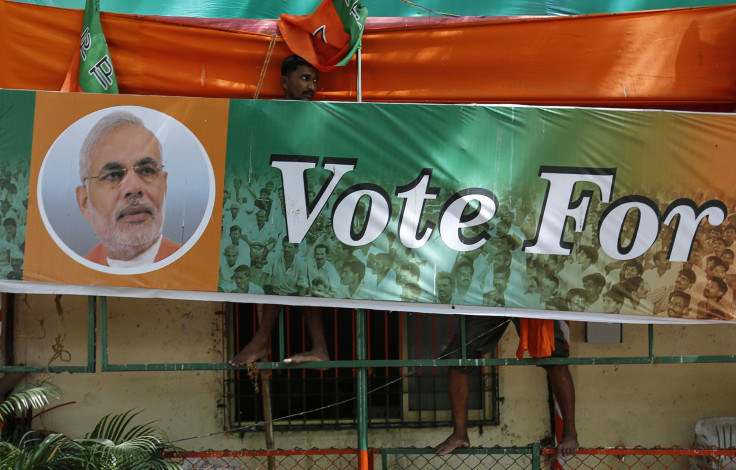India Vote Count Puts Modi On Course For Resounding Win

(Reuters) - Early counting of results in India's general election put opposition leader Narendra Modi on course for a resounding victory that would hand him a clear mandate for his agenda to revive growth and create jobs.
Early returns showed Modi's Hindu nationalist Bharatiya Janata Party (BJP) and its allies leading in 208 parliamentary seats. The ruling Congress party alliance was ahead in just 70, according to NDTV news.
Modi was ahead in both of the constituencies he contested - in Vadodara in his home state of Gujarat and in the Hindu holy city of Varanasi.
Rahul Gandhi, who led the Congress campaign, was lagging in the constituency where he stood for election. A loss there would spell disaster for the great grandson of India's independence leader and cast the political future of the Nehru-Gandhi dynasty into serious doubt.
If early trends are confirmed the BJP and its allies would win an absolute majority of more than 272 seats in the lower house of parliament, bearing out the findings of exit polls.
"The exit polls were right," said N. Ram, publisher of the Hindu newspaper.
Exit polls got the results badly wrong in 2004 and 2009.
Such an outcome would open the way for Modi, 63, to become prime minister and act quickly to form the core of a new government by naming loyalists to the prized cabinet posts of finance, home, defense and external affairs.
Betting on a Modi win, foreign investors have poured more than $16 billion into Indian stocks and bonds in the past six months and now hold over 22 percent of Mumbai-listed equities - a stake estimated by Morgan Stanley at almost $280 billion.
MODI WAVE
Since being named as his party's candidate last September, Modi has flown 300,000 km and addressed 457 rallies in a slick, presidential-style campaign that has broken the mould of Indian politics.
In so doing, Modi has outclassed Gandhi, 43, while burnishing his pro-business record as chief minister of the western state of Gujarat.
Prime Minister Manmohan Singh, who as finance minister launched reforms in 1991 that brought an end to decades of economic isolation, has already bid farewell to his staff after a decade in office marked by mounting policy paralysis.
Modi's mantra of development has won over many voters skeptical about his Hindu-centric ideology and role in sectarian riots in his home state in 2002 in which more than 1,000 people,
mainly Muslims, died. He has denied any wrongdoing and a probe ordered by the Supreme Court has found he had no case to answer.
Exit polls estimate that the BJP's vote share rose by 15 percentage points to 34 percent. Under India's first-past-the-post system, that may be enough for the BJP to take battleground states like Uttar Pradesh - home to one in every six Indians.
"MODINOMICS"
Modi has promised that, if elected, he would take decisive action to unblock stalled investments in power, road and rail projects to revive economic growth that has fallen to a decade low of below 5 percent.
Tax and labor market reforms, backed by a gradual opening up to foreign investment, would seek to create the 10 million jobs that Asia's third-largest economy must create every year to employ young people entering the workforce.
If Modi does fall short of a majority, he could face lengthy coalition talks with regional parties that might demand a high price for their loyalty and dilute his reform agenda.
Modi has retreated to his home base in Gujarat, where he will learn of the election results on Friday before flying to New Delhi for what could be a hero's welcome from party loyalists clad in the BJP's orange colors.
© Copyright IBTimes 2024. All rights reserved.











